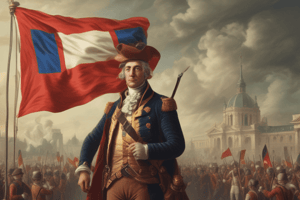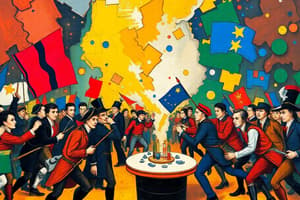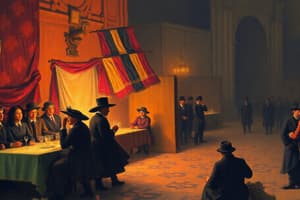Podcast
Questions and Answers
Which of these events is best described as a modern example of the type of irreversible change attributed to the Industrial Revolution in the provided information?
Which of these events is best described as a modern example of the type of irreversible change attributed to the Industrial Revolution in the provided information?
- The invention of the steam engine
- The Renaissance
- The development of the Internet (correct)
- The invention of the printing press
What makes the French Revolution a paradigm of a political revolution?
What makes the French Revolution a paradigm of a political revolution?
- It was a revolution that influenced the political development of many other countries. (correct)
- It was the first successful political revolution in recorded history.
- It was the only revolution to be initiated by an educated elite group.
- It was a revolution that brought about the most radical and sweeping changes to a political system.
What is a key feature common to both the Industrial Revolution and political revolutions?
What is a key feature common to both the Industrial Revolution and political revolutions?
- Both are characterized by irreversible changes that fundamentally alter society. (correct)
- Both involve the overthrow of a political system.
- Both are often fueled by popular discontent with current conditions.
- Both involve a period of extreme violence and anarchy.
What role does an educated elite group typically play in a political revolution?
What role does an educated elite group typically play in a political revolution?
What is a key distinction between the educated elite and the radicals in a revolution?
What is a key distinction between the educated elite and the radicals in a revolution?
Flashcards
Revolution
Revolution
A significant change to a political, social, or economic system.
French Revolution
French Revolution
A pivotal revolution that began in 1789, influencing modern politics and society.
Monarchy
Monarchy
A government where one person holds supreme power, often a king or queen.
Radical
Radical
Signup and view all the flashcards
Anarchy
Anarchy
Signup and view all the flashcards
Study Notes
Effects of Revolutions
- Revolutions are irreversible changes to political, social, or economic systems
- The French Revolution (1789) significantly impacted Europe and the world
- Revolutions aren't caused by one event; multiple factors cause revolutionary situations
- Often begin with an event but end/beginnings are hard to pinpoint
- Usually, revolutions are led by educated elites who want a Constitution and liberal reforms
- But often extremists take over, resulting in radical change, violence, and anarchy
- Human rights are often suspended during revolutions
Defining Political Terms
- Monarchy: A government with one ruler (e.g., a king or queen), typically with varying degrees of power
- Radical: Extreme viewpoints, often advocating for significant, drastic change, sometimes using violence
- Liberal: Open to new ideas and progress, prioritizing individual rights and freedoms
- Anarchy: Absence of governing law and order; a state of chaos and lawlessness
Studying That Suits You
Use AI to generate personalized quizzes and flashcards to suit your learning preferences.





